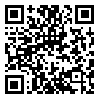BibTeX | RIS | EndNote | Medlars | ProCite | Reference Manager | RefWorks
Send citation to:
URL: http://jdisabilstud.org/article-1-3259-en.html
2- Master student in clinical psychology, Yazd Branch, Islamic Azad University, Yazd, Iran
Abstract
Background & Objectives: Family is a cohesive and emotional network of intertwined interactions that arises from the marital bond between a man and a woman. The stability of marriage requires awareness of the impact of one's choices. The upward trend in divorce rates and the existence of conflicts and disruptions in marital interactions have motivated researchers to find effective factors and suitable solutions to cope with the breakdown of relationships. One influential factor in the instability of marital relationships is the differentiation between spouses. Differentiation reflects the individual's ability to separate rational and emotional processes from each other. Another influential factor in the instability of marital relationships is jealousy, as jealousy in couples can generate damages that increase the likelihood of the relationship's collapse. One of the methods of psychotherapy that can be effective as an intervention option in reducing marital problems is reality therapy. Reality therapy can be effective in increasing differentiation and reducing jealousy in couples. This research studied the effectiveness of reality therapy on the differentiation and jealousy of couples referring to counseling centers in Yazd City, Iran.
Methods: The research method was a quasi–experimental type of pretest–posttest and a two–month follow–up design with a control group. The statistical population of the research included all the couples referred to counseling centers in Yazd city in 2022–2023. The samples were selected voluntarily using the available sampling method. A total of 30 people were randomly divided into the control and experimental groups (15 people in each group). The inclusion criteria were as follows: couples experiencing difficulties in marital relationships as diagnosed by the Family Counseling Center, a minimum of three years of marriage, and a willingness to participate in the study. The exclusion criteria included participation in simultaneous educational sessions and absence from more than two sessions in the experimental group. The research tools were self–inventory differentiation (Skowron & Schmitt, 2003) and the jealousy questionnaire (Valizadeh & Azarbaijani, 2010). The experimental group received reality therapy during eight 1–hour sessions, and the control group did not receive any intervention. The present study observed ethical standards, including obtaining informed consent and ensuring privacy and confidentiality. The research data were analyzed at two levels: descriptive and inferential statistics. At the descriptive level, indicators such as mean and standard deviation were used, and at the inferential level, the repeated measures analysis of variance and Bonferroni's post hoc test were used. The data obtained through statistical software SPSS version 26 were analyzed at a significance level of 0.05.
Results: The results showed that the effect of time (p<0.001), group (p<0.001), and the interaction effect of group and time (p<0.001) were significant on differentiation and jealousy variables. Also, a significant increase in the scores of the differentiation variable (p<0.001) and a significant decrease in the scores of the jealousy variable (p<0.001) were observed in the experimental group in the posttest stages compared to the pretest. In contrast, none of the differences in the averages were significant in the control group (p=1.00). Also, the effect of the reality therapy intervention was confirmed for the differentiation variable (p=0.004) and the jealousy variable (p=0.007) in the experimental group in the follow–up phase.
Conclusion: According to the results, reality therapy increased differentiation and decreased jealousy. Therefore, it can be said that reality therapy can improve differentiation and jealousy in couples with marital problems.
| Rights and permissions | |
 |
This work is licensed under a Creative Commons Attribution-NonCommercial 4.0 International License. |



